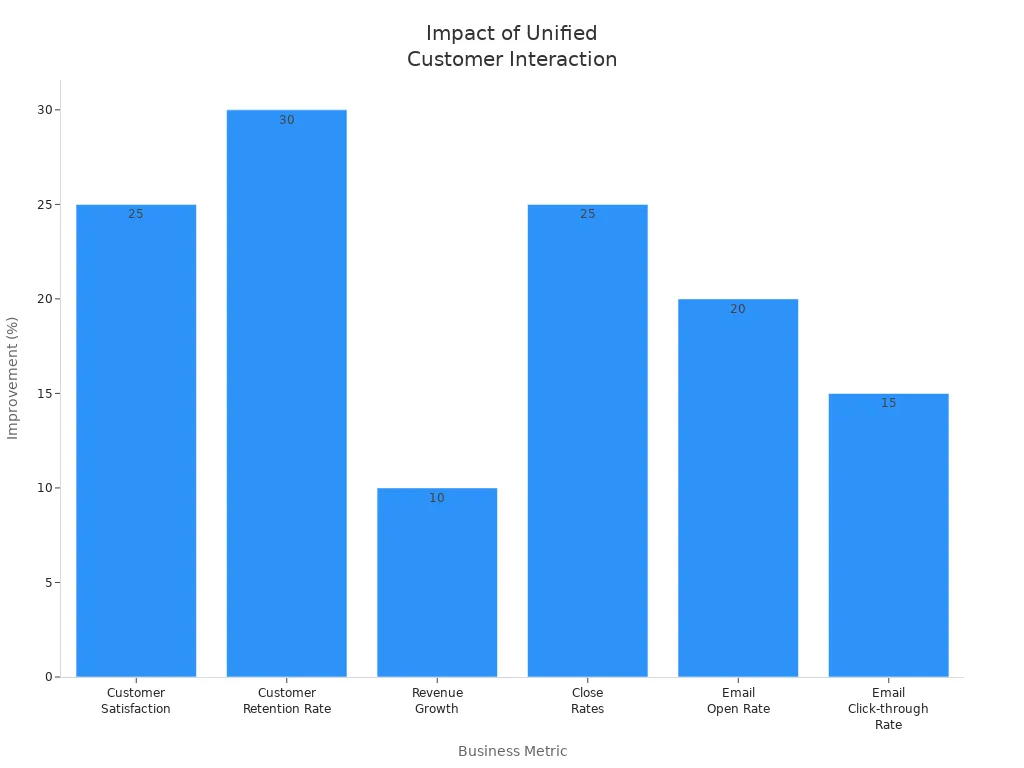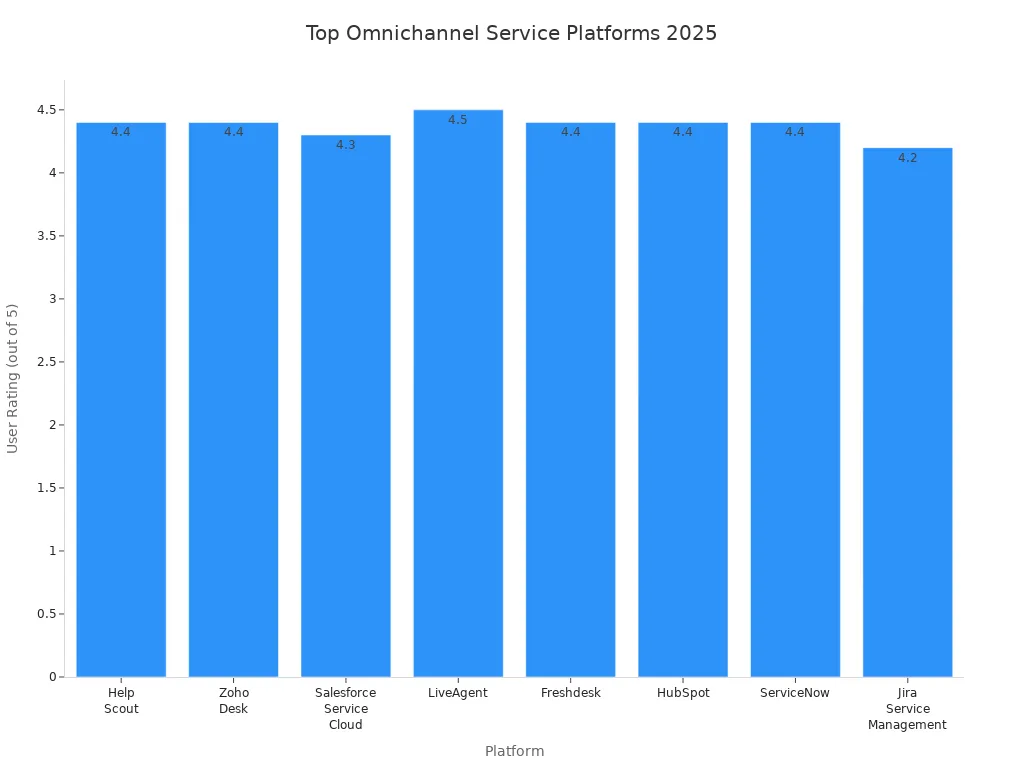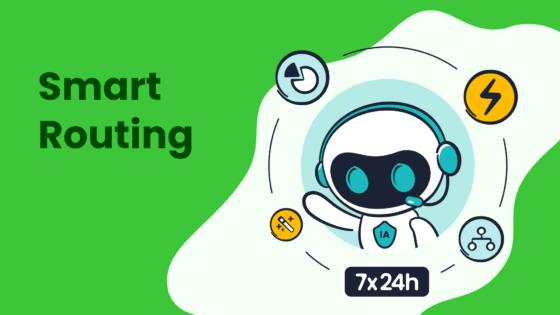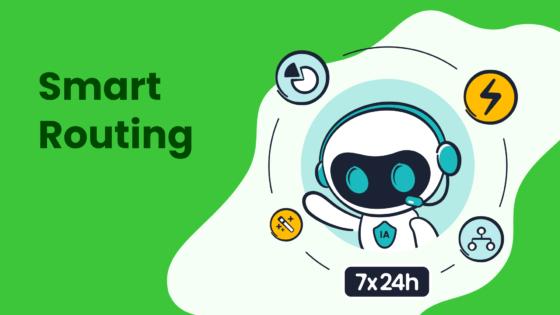Top Omnichannel Customer Service Software for Every Business

Modern businesses rely on omnichannel customer service software to meet rising customer expectations. Over 90% of companies plan to implement omnichannel strategies by 2025, as seamless, unified interactions drive significant gains.
- Companies with robust omnichannel approaches achieve:
- 91% greater year-over-year customer retention
- Purchase and engagement rates 250% higher than single-channel efforts
- 30% more purchases from customers using multiple channels

Sobot and Sobot AI help organizations deliver unified customer service, supporting global operations and driving measurable improvements in satisfaction and loyalty. Selecting the right omnichannel platform depends on business size, industry, and customer needs.
Best Omnichannel Customer Service Software

Quick Comparison Overview
Selecting the best omnichannel software depends on business needs, team size, and customer expectations. The market offers a wide range of customer support platforms, each with unique strengths. The table below compares some of the most highly rated omnichannel customer service software options for 2025:
| Platform | Best For | Key Features & Strengths | User Rating (Reviews) | Starting Price (per month) |
|---|---|---|---|---|
| Sobot | Unified, AI-powered, global | All-in-one contact center, AI automation, 99.99% uptime, global telephony, WhatsApp BSP, CRM integration | 4.7 (1,000+) | Custom quote |
| Help Scout | Email-focused support | Easy navigation, built-in knowledge base, mobile apps | 4.4 (400+) | $20 |
| Zoho Desk | Cost-conscious businesses | CRM integration, automation, self-service, great support | 4.4 (5,000+) | $14 |
| Salesforce Service Cloud | Large enterprises | Custom dashboards, Einstein AI, Salesforce ecosystem | 4.3 (3,500+) | $25 |
| LiveAgent | Chat-focused teams | Live chat, gamification, live dashboards | 4.5 (1,400+) | $9 |
| Freshdesk | Small & large businesses | Automation, CRM, free plan available | 4.4 (3,000+) | $12 |
| HubSpot Service Hub | HubSpot users | Integrated CRM, live chat, third-party integrations | 4.4 (10,000+) | $15 |
| ServiceNow | Enterprise IT teams | ITSM focus, workflow control, asset management | 4.4 (1,900+) | Custom quote |
| Jira Service Management | IT teams | ITSM, asset management, Atlassian integration | 4.2 (700+) | $55 |

Sobot stands out as a best omnichannel software choice for businesses seeking a unified, AI-powered solution with global reach and high reliability. Its platform supports over 10,000 brands worldwide, offering seamless integration, advanced automation, and a 99.99% uptime guarantee.
Top Picks for Small Businesses
Small businesses need best omnichannel software that is affordable, easy to use, and scalable. The right customer support platforms help streamline communication, automate repetitive tasks, and improve customer satisfaction. The table below highlights top options:
| Software | Key Features & Strengths | Target Audience | Pricing (Starting at) |
|---|---|---|---|
| Sobot | Unified inbox, AI chatbot, WhatsApp API, ticketing, mobile support, easy setup | Small teams, startups, e-commerce | Custom quote |
| Desk365 | Cloud-based ticketing, omnichannel integration, shared inbox, mobile access | Small businesses needing robust ticket management | $12/agent/month |
| Zoho Desk | Multichannel support, customization, integrations, scalable help desk | Flexible, scalable solutions | $20/agent/month |
| Gorgias | E-commerce focus, Shopify/BigCommerce/Magento integration, omnichannel comms | E-commerce businesses | $10/month per 50 tickets |
| Groove | Shared inbox, automation, live chat, knowledge base | Lean teams needing simple support | $6/user/month |
Sobot provides small businesses with a unified workspace, AI-powered chatbot, and seamless integration with popular channels like WhatsApp and email. These features help teams manage customer service efficiently and scale as they grow. Desk365 and Zoho Desk also offer strong automation and ticketing, making them popular customer support tools for small teams.
Top Picks for Midsize Companies
Midsize companies require best omnichannel software that can unify multiple channels, automate workflows, and provide actionable insights. The following features set leading customer support platforms apart for this segment:
- Integration of all communication channels for a seamless customer experience.
- Centralized CRM to consolidate customer data and personalize interactions.
- Omnichannel routing to direct inquiries to the right agents.
- Advanced AI and automation, including chatbots for instant support.
- Consistent messaging and branding across every channel.
- Empowered teams with cross-channel knowledge and collaborative tools.
- Data-driven insights to improve efficiency and satisfaction.
Sobot delivers these capabilities through its all-in-one contact center, AI-driven automation, and unified workspace. The platform supports integration with Salesforce, Shopify, and other business systems, making it a best omnichannel software choice for midsize organizations. Kustomer and Zoho Desk also offer strong automation and CRM integration, but Sobot’s global telephony and 99.99% uptime provide added reliability.
Tip: Midsize companies should focus on identifying their most-used channels and ensure all are integrated into a single customer experience. Training teams on omnichannel best practices boosts both efficiency and customer satisfaction.
Top Picks for Enterprises
Large enterprises need best omnichannel software that can scale globally, handle high volumes, and deliver advanced analytics. The table below summarizes top customer support platforms for enterprises:
| Platform | Key Features | Suitability for Large Enterprises |
|---|---|---|
| Sobot | Global telephony, AI automation, unified workspace, WhatsApp BSP, 99.99% uptime, secure integration | Scalable for B2B and B2C, supports complex workflows, trusted by brands like Samsung, Opay, and Michael Kors |
| Adobe Experience Cloud | Real-time analytics, personalized journeys, multi-channel content management, 24/7 support | Integrates customer data and marketing tools, supports B2B/B2C, enables personalized experiences across channels |
| Glassix | AI-powered chatbot, SMS/Email/WhatsApp integration, automated lead routing, real-time feedback | AI-driven engagement, personalized experiences, multi-channel integration |
| Priority Software | Omnichannel management across POS, promotions, inventory, finance, ERP/CRM integration | Streamlines operations, supports B2B/B2C, flexible customization, centralized management |
| Shopify Plus | Multi-channel content management, customer insights, real-time expectation management | E-commerce focus, multi-site management, centralized analytics, scalable for large enterprises |
Sobot’s enterprise solution supports over 6 million online communications and 3 million phone calls daily. Its platform offers global number availability, encrypted data transfer, and seamless integration with existing CRM and technology systems. Sobot’s customer success stories, such as Opay, show measurable improvements in customer satisfaction and operational efficiency. Enterprises benefit from Sobot’s robust AI, proactive analytics, and industry versatility, making it a best omnichannel software leader for global organizations.
What Is Omnichannel Customer Service Software
Definition and Core Features
Omnichannel customer service software connects all communication channels into one unified system. This approach allows companies to deliver a seamless customer experience, no matter how or where customers reach out. Customers can start a conversation on social media, continue it by email, and finish it over the phone without repeating themselves.
- Integrated communication channels that provide a single view of each customer’s history and preferences.
- Consistent service quality across every channel.
- Seamless transitions, so customers never lose context when switching channels.
- Personalized service, using unified data to tailor every interaction.
Sobot, for example, offers omnichannel solutions that unify voice, chat, email, and WhatsApp, helping businesses deliver consistent and efficient customer service.
Omnichannel vs. Multichannel
| Aspect | Omnichannel Customer Service Software | Multichannel Customer Service Software |
|---|---|---|
| Integration | All channels connect in real time, sharing customer history and context. | Channels operate separately, creating silos and disconnected experiences. |
| Customer Experience | Seamless, consistent, and personalized. Customers switch channels without losing information. | Fragmented. Customers may repeat information and face inconsistent service. |
| Data Accessibility | Unified data enables proactive support and engagement. | Limited data sharing reduces personalization and efficiency. |
| Agent Efficiency | Agents see full customer history, resolving issues faster and with fewer errors. | Agents work in isolation, which can slow down resolution and increase mistakes. |
| Customer Satisfaction | Higher, due to connected experiences and tailored responses. | Lower, because of disconnected channels and inconsistent quality. |
Omnichannel customer service software stands out by integrating every channel, while multichannel solutions keep them separate. This difference leads to better customer experience and higher satisfaction scores for omnichannel users.
Why Omnichannel Matters
Omnichannel strategies have a major impact on both customer satisfaction and business efficiency. Companies using omnichannel customer service software see higher retention rates—up to 89%—and faster issue resolution. Customers enjoy seamless, personalized service, which increases loyalty and drives more transactions.
- Integrated systems let agents focus on complex issues, boosting productivity.
- Centralized data helps businesses understand customer needs and improve service.
- Omnichannel marketing uses these insights to deliver targeted, effective campaigns across all platforms.
Sobot’s omnichannel platform, for instance, helps businesses achieve these results by combining AI, automation, and unified data. This approach not only improves the customer experience but also streamlines operations and reduces costs.
Key Features of the Best Omnichannel Software
Unified Inbox and Channel Integration
The best omnichannel software brings all customer support channels—such as email, chat, phone, and social media—into a single, unified inbox. This integration allows agents to manage every conversation from one place, reducing the need to switch platforms. With AI-based routing and real-time collaboration, teams resolve issues faster and deliver consistent service. Sobot’s unified workspace, for example, enables agents to access complete customer histories and prioritize urgent requests. This approach leads to higher productivity and improved customer satisfaction, as agents can respond quickly and accurately.
AI and Automation
AI and automation stand at the core of modern omnichannel features. Intelligent chatbots handle routine inquiries, provide instant answers, and escalate complex issues to human agents. Automation streamlines repetitive tasks, such as ticket assignment and follow-ups, freeing agents to focus on more complex problems. Sobot’s AI-powered solutions offer 24/7 support, predictive analytics, and workflow automation, ensuring customers receive timely and personalized service. These omnichannel features help businesses scale operations and maintain high-quality support across all channels.
Analytics and Reporting
Advanced analytics and reporting are essential omnichannel features for data-driven decision-making. The best omnichannel software provides real-time dashboards, performance metrics, and customer insights. Organizations can track response times, resolution rates, and agent productivity. Sobot’s analytics tools use AI to uncover patterns, predict customer needs, and optimize support strategies. With interactive data visualization, teams can quickly identify trends and make informed improvements, leading to better customer experiences and operational efficiency.
CRM and Ecommerce Integrations
Seamless CRM and ecommerce integrations are vital for the best omnichannel software. These integrations centralize customer data, order history, and support tickets, making information accessible to all teams. Sobot connects with platforms like Salesforce and Shopify, enabling agents to personalize interactions and resolve issues efficiently. Automated workflows and data syncing reduce manual errors and improve the customer journey. These omnichannel features support upselling, cross-selling, and targeted marketing, driving business growth.
Scalability and Security
Scalability and security define the reliability of any omnichannel platform. The best omnichannel software must handle growing volumes of interactions without sacrificing performance. Sobot delivers 99.99% uptime, global telephony, and encrypted data transfer, meeting the needs of businesses in finance, retail, and beyond. End-to-end encryption, regulatory compliance, and dynamic resource allocation ensure customer data stays safe as operations expand. These omnichannel features guarantee uninterrupted service and future-proof growth.
Sobot Omnichannel Solution
Overview and Core Capabilities
Sobot delivers a robust omnichannel platform designed for businesses seeking unified communication and operational efficiency. The solution integrates voice, chat, email, and social messaging into a single workspace. Sobot’s all-in-one contact center supports over 10,000 brands in 18+ languages, handling millions of interactions daily. The platform stands out for its 99.99% uptime, global telephony, and AI-driven automation. Comprehensive training and support help teams maximize platform value.
| Capability Aspect | Sobot | Competitors Example(s) |
|---|---|---|
| Training and Support | Comprehensive training and support | Quick setup, advanced customization |
| Integration | AI-powered, designed for integration | Fast integration with CRMs |
| Customization | Not explicitly detailed | Advanced customization options |
| Scalability | Not explicitly detailed | Scalable solutions |

Voice/Call Center Features
Sobot’s voice and call center features enable businesses to manage global customer interactions efficiently. The platform unifies live chat, ticketing, and voice support, improving response times and internal organization. Sobot’s AI-driven omnichannel approach remembers customer context across channels, creating a seamless customer experience. The system supports global telephony, multilingual service, and integration with messaging apps like WhatsApp Business API.
- Centralized platform for all communication channels
- AI-powered routing and context retention
- Supports over 10 communication channels
- Reduces response times by up to 80%
Sobot’s centralized hub helps teams deliver faster answers and better organization, supporting both startups and multinational enterprises.
AI-Powered Chatbot and Automation
Sobot leverages generative AI to transform engagement across omnichannel customer support platforms. The AI-powered chatbot handles routine inquiries, provides instant responses, and escalates complex issues to human agents. Automation streamlines repetitive tasks, allowing agents to focus on higher-value interactions. Industry trends show that AI adoption in customer communication will reach 97% by 2025 (source), making Sobot’s AI-first strategy highly relevant.
- 24/7 AI chatbot for instant support
- Personalized, secure, and flexible interactions
- Automation reduces manual workload
Integration and Security
Sobot ensures seamless integration and robust security for enterprise clients. The platform offers an SDK and API for connecting with popular CRM systems and business tools. Customizable workflows and automation features enhance operational efficiency. Sobot implements advanced security measures, including data encryption and user authentication, to protect sensitive information. The scalable infrastructure supports high volumes of omnichannel interactions.
- SDK and API for integration with CRMs
- Customizable workflows and automation
- Data encryption and user authentication
- Scalable to meet enterprise demands
Customer Success Story: Opay
Opay, a leading financial service platform, partnered with Sobot to unify its omnichannel customer support platforms. Opay faced challenges managing high volumes of customer interactions across social media, email, and voice channels. After implementing Sobot’s solution, Opay increased customer satisfaction from 60% to 90%, reduced costs by 20%, and improved conversion rates by 17%. The unified platform enabled seamless communication and efficient service delivery, demonstrating the power of Sobot’s omnichannel approach. Opay’s success highlights how Sobot can transform customer experience and operational efficiency for businesses of any size.
How to Choose Omnichannel Customer Service Software
Assessing Business Needs
Every business should start by identifying its unique requirements before selecting an omnichannel solution. Key factors to consider include:
- Integration with CRM systems for centralized customer data and personalized interactions.
- Support for seamless communication across channels, allowing conversations to move from email to chat or phone without losing context.
- Compatibility with existing helpdesk tools to ensure smooth collaboration between teams.
- Scalability and flexibility to handle changing inquiry volumes and business growth.
- Automation and AI features to manage repetitive questions and boost efficiency.
- Analytics and reporting tools to track performance and align with business goals.
- Addressing pain points such as high inquiry volumes, the need for AI, and team training.
Sobot, for example, offers robust integration and automation, making it suitable for businesses aiming to unify their communication channels and scale operations.
Comparing Pricing and ROI
Businesses should compare pricing by listing all costs, including software, marketing, and staffing. Calculating return on investment (ROI) helps determine the value of an omnichannel platform. The formula is:
ROI = ((Revenue - Costs) / Costs) * 100
For instance, if a company spends $10,000 on technology and staff and generates $55,000 in sales, the ROI reaches 450%. Tracking metrics like revenue, expenses, and customer journey stages helps evaluate the effectiveness of the investment. Companies such as Telefónica Germany have seen improved scalability and customer satisfaction after adopting AI-powered omnichannel solutions.
Evaluating Usability and Support
Usability and vendor support play a crucial role in successful adoption. Important factors include:
- Customizability to fit business workflows.
- User experience that encourages employee adoption and reduces training time.
- Seamless integration with CRM and analytics systems.
- Ability to manage interactions across chat, social media, email, and phone.
- Strong onboarding, training, and ongoing support.
- Access to community resources and product updates.
Businesses should use vendor scorecards, request custom demos, and gather feedback from current clients to assess reliability and support quality. Sobot provides comprehensive training and ongoing support, ensuring smooth transitions and high user satisfaction.
Implementation Steps
A structured approach ensures a smooth rollout of omnichannel software:
- Map the customer journey to identify key channels and pain points.
- Select a platform with core features like a unified inbox, CRM integration, and analytics.
- Train teams to adopt new workflows and emphasize cross-channel communication.
- Launch a pilot program with a small team to test and gather feedback.
- Monitor progress, measure impact, and optimize the strategy based on results.
Tip: Continuous measurement and feedback help businesses refine their omnichannel strategy and maximize value.
Common Pitfalls in Omnichannel Implementation

Integration Challenges
Many businesses face integration challenges when adopting omnichannel customer service software. Different channel interfaces and functionalities often create data silos, making it hard for agents to access relevant customer information. Teams may struggle to sync data across all channels, which can lead to manual data transfer and human error. Integrating new software sometimes requires replacing outdated systems, which can disrupt operations. Seamless integration of online and offline channels is essential for a consistent customer experience. Companies must also unify customer profiles by combining data from every channel into a centralized database. Real-time data sharing, often through CRM systems, helps maintain consistency and supports a holistic view of customer behavior. Sobot addresses these challenges by offering robust integration capabilities and a unified workspace, ensuring smooth data flow and consistent service.
Training and Change Management
Training and change management play a critical role in successful omnichannel implementation. Businesses need thorough preparation, including selecting the right solution and setting realistic goals. Ongoing training programs equip staff with the skills needed for omnichannel success. Change management helps overcome employee resistance and keeps morale high during transitions. Regular feedback and evaluation identify training gaps and improve learning programs. Leadership involvement and employee engagement foster a supportive culture. Training should cover both basic system use and complex problem-solving scenarios. Sobot provides comprehensive onboarding and continuous support, helping teams adapt to new workflows and technologies.
Scalability Issues
Scalability issues often arise as businesses grow and customer volumes increase. Companies must manage more interactions without starting from scratch. Easy channel integration allows agents to handle all customer conversations from one place, preserving history and context. Automation, such as AI-powered chatbots and automated call routing, handles routine tasks efficiently. Scalable platforms like Sobot grow with the business, allowing new channels and features to be added smoothly. Customization options help tailor the platform to evolving needs. Advanced analytics and reporting provide insights into response times, resolution rates, and customer satisfaction, supporting resource optimization and service quality.
Stakeholder Involvement
Stakeholder involvement is vital for the success of any omnichannel project. Engaging stakeholders ensures alignment of objectives and clear communication. Active participation fosters collaboration across departments, unifying teams toward customer-centric goals. Stakeholder engagement builds trust and supports smoother implementation. Prioritizing requirements with input from all parties helps balance functionality, cost, and usability. Managing expectations prevents unrealistic demands and aligns technology with business goals. Continuous engagement supports transparency and accountability, which are critical for complex omnichannel operations.
Tip: Involve stakeholders early and often to ensure your omnichannel strategy meets business needs and delivers a seamless customer experience.
Recommendations by Business Type
Startups and Small Teams
Startups and small teams often need solutions that are easy to set up, affordable, and flexible. Many choose platforms that offer a unified dashboard, AI-powered chatbots, and integration with popular channels. Sobot provides a unified workspace and AI chatbot, making it simple for small teams to manage conversations across multiple channels. HubSpot and Tidio also offer intuitive dashboards and multi-channel support, which help startups streamline communication and automate routine tasks.
| Software | Recommended Business Type | Key Features | Pricing Highlights |
|---|---|---|---|
| Sobot | Startups, Small Teams | Unified inbox, AI chatbot, WhatsApp API, ticketing, mobile support | Custom quote |
| Tidio | Startups, Ecommerce, SMBs | Multi-channel support, AI chatbots, Shopify & WhatsApp integrations, analytics | Free plan, Starter ($24.17/mo) |
| HubSpot | Startups, SMBs | CRM integration, multi-channel ticket conversion, knowledge base | Free version, Starter ($20/mo/seat) |
Startups benefit from omnichannel marketing by reaching customers on their preferred platforms and automating repetitive support tasks. Sobot’s easy setup and mobile compatibility help small teams deliver a consistent customer experience from day one.
Ecommerce and Retail
Ecommerce and retail businesses require fast, personalized responses and seamless integration with shopping platforms. Sobot connects with Shopify and other ecommerce tools, allowing agents to view order history and customer data in one place. Tidio also offers Shopify integration and AI chatbots, which help automate order updates and answer common questions. These features support omnichannel marketing strategies, enabling brands to engage shoppers through chat, email, and social media.
- Sobot’s unified workspace and WhatsApp API help retailers manage high volumes of inquiries during sales events.
- Automated workflows and analytics provide insights into customer behavior, supporting targeted campaigns.
Omnichannel marketing in ecommerce ensures that customers receive timely updates and personalized offers, increasing loyalty and sales.
Call Centers and Service Centers
Call centers and service centers handle large volumes of customer inquiries every day. They need platforms that offer advanced automation, ticket routing, and integration with phone systems. Sobot’s voice and call center features include intelligent IVR, global telephony, and AI-powered routing. These tools help agents resolve issues quickly and maintain high service levels. Happyfox and Sprinklr also provide ticket automation and phone integration, but Sobot’s 99.99% uptime and secure data transfer make it a reliable choice for high-volume environments.
- Sobot’s analytics dashboard tracks response times and agent performance.
- AI-powered chatbots handle routine questions, freeing agents for complex cases.
Omnichannel marketing in call centers enables proactive outreach, such as sending follow-up messages or satisfaction surveys across multiple channels.
B2B vs. B2C
B2B and B2C organizations have different needs when it comes to omnichannel marketing. B2B companies often require deeper CRM integration and longer sales cycles, while B2C brands focus on high-volume, real-time engagement. Sobot adapts to both models by offering customizable workflows, CRM integration, and support for multiple communication channels.
| Business Model | Key Omnichannel Needs | Sobot Capabilities |
|---|---|---|
| B2B | CRM integration, personalized support, workflow automation | Salesforce integration, unified workspace, analytics |
| B2C | Fast response, high-volume messaging, social media integration | WhatsApp API, AI chatbot, mobile support |
Omnichannel marketing helps B2B companies nurture leads with personalized follow-ups, while B2C brands use it to deliver instant support and targeted promotions.
Choosing the right customer service software shapes business growth and customer satisfaction. Companies that use unified solutions like Sobot report up to 90% customer satisfaction and a 20% reduction in costs. Readers should review the criteria and product comparisons in this guide to make informed decisions. Next steps include starting a free trial or requesting a demo from vendors. The right platform can transform support operations and help any business achieve long-term success.
FAQ
What is omnichannel customer service software?
Omnichannel customer service software connects all support channels, such as chat, email, and phone, into one system. This approach gives agents a complete view of each customer. Sobot’s platform unifies these channels, helping businesses improve satisfaction and efficiency.
How does Sobot ensure data security for customer interactions?
Sobot uses encrypted data transfer and user authentication to protect customer information. The platform meets strict security standards and supports global compliance. Sobot’s 99.99% uptime and secure infrastructure help businesses maintain trust and reliability.
Can Sobot integrate with existing CRM and ecommerce systems?
Yes. Sobot offers seamless integration with popular CRM and ecommerce platforms, including Salesforce and Shopify. This integration allows agents to access customer data and order history in real time, improving the omnichannel customer service software experience.
What results can businesses expect from using Sobot’s omnichannel solution?
Businesses using Sobot’s omnichannel customer service software have seen customer satisfaction rates rise to 90%. Opay, for example, reduced costs by 20% and increased conversion rates by 17% after adopting Sobot’s unified platform.
Why should small businesses consider omnichannel customer service software?
Small businesses benefit from omnichannel customer service software by streamlining communication and automating routine tasks. Sobot’s unified workspace and AI chatbot help small teams manage multiple channels efficiently, leading to faster responses and higher customer satisfaction.
Tip: Sobot’s free trial lets businesses explore omnichannel features before making a commitment. Visit Sobot’s website for more details.
See Also
Comprehensive Overview Of Omnichannel Call Center Platforms
Step-By-Step Process For Deploying Omnichannel Contact Centers
Leading Customer Service Software Solutions To Watch In 2024
